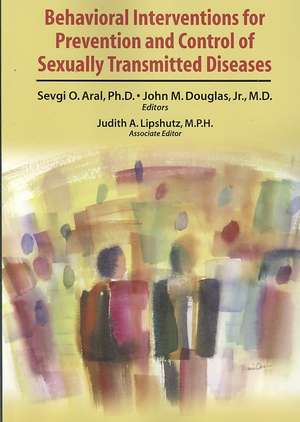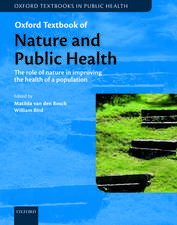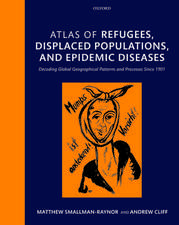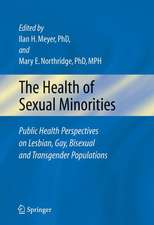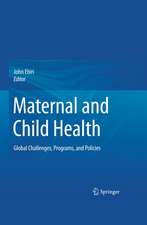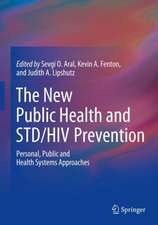Behavioral Interventions for Prevention and Control of Sexually Transmitted Diseases
Judith A. Lipshutz Editat de Sevgi O. Aral Cuvânt înainte de H. H. Handsfield Editat de John M. Douglas Cuvânt înainte de E. W. J. Hooken Limba Engleză Paperback – 3 dec 2008
As STDs and AIDS remain top priorities for public health and private sector practitioners, researchers, and educators, “Behavioral Interventions for Prevention and Control of Sexually Transmitted Diseases” gives a long-neglected field the attention it deserves. This authoritative resource is sure to influence public health practice and policy in an ever-evolving social climate.
| Toate formatele și edițiile | Preț | Express |
|---|---|---|
| Paperback (1) | 393.08 lei 6-8 săpt. | |
| Springer Us – 3 dec 2008 | 393.08 lei 6-8 săpt. | |
| Hardback (1) | 399.64 lei 6-8 săpt. | |
| Springer Us – 6 iun 2007 | 399.64 lei 6-8 săpt. |
Preț: 393.08 lei
Preț vechi: 413.76 lei
-5% Nou
Puncte Express: 590
Preț estimativ în valută:
75.22€ • 81.68$ • 63.19£
75.22€ • 81.68$ • 63.19£
Carte tipărită la comandă
Livrare economică 22 aprilie-06 mai
Preluare comenzi: 021 569.72.76
Specificații
ISBN-13: 9780387857688
ISBN-10: 0387857680
Pagini: 577
Ilustrații: XXX, 578 p.
Dimensiuni: 178 x 254 x 33 mm
Greutate: 1.02 kg
Ediția:2007
Editura: Springer Us
Colecția Springer
Locul publicării:New York, NY, United States
ISBN-10: 0387857680
Pagini: 577
Ilustrații: XXX, 578 p.
Dimensiuni: 178 x 254 x 33 mm
Greutate: 1.02 kg
Ediția:2007
Editura: Springer Us
Colecția Springer
Locul publicării:New York, NY, United States
Public țintă
Professional/practitionerCuprins
Overview Chapters: Behavioral Interventions.- History of Behavioral Interventions in STD Control.- Behavioral Interventions for STDs: Theoretical Models and Intervention Methods.- Biomedical Interventions.- Intervention Approaches.- Dyadic, Small Group, and Community-Level Behavioral Interventions for STD/HIV Prevention.- Structural Interventions.- STD Prevention Communication: Using Social Marketing Techniques with an Eye on Behavioral Change.- Partner Notification and Management Interventions.- Interventions in Sexual Health Care–Seeking and Provision at Multiple Levels of the U.S. Health Care System.- Use of the Internet in STD/HIV Prevention.- Male Condoms.- STI Vaccines: Status of Development, Potential Impact, and Important Factors for Implementation.- Interventions by Population.- Behavioral Interventions for Prevention and Control of STDs Among Adolescents.- Biological and Behavioral Risk Factors Associated with STDs/HIV in Women: Implications for Behavioral Interventions.- STD Prevention with Men Who Have Sex with Men in the United States.- STD Repeaters: Implications for the Individual and STD Transmission in a Population.- Looking Inside and Affecting the Outside: Corrections-Based Interventions for STD Prevention.- STDs Among Illicit Drug Users in the United States: The Need for Interventions.- Understanding Methods.- Quantitative Measurement.- Qualitative Methods.- From Data to Action: Integrating Program Evaluation and Program Improvement.- Cost-Effectiveness Analysis.- From Best Practices to Better Practice: Adopting Model Behavioral Interventions in the Real World of STD/HIV Prevention.- Ethical and Policy Issues.- Erratum.- Erratum.- The Ethics of Public Health Practice for the Prevention and Control of STDs.- Policy and Behavioral Interventions forSTDs.
Recenzii
From the reviews:
"This book represents a landmark in the field of STD prevention and management bringing together a comprehensive overview of the most critical aspects of behavioral interventions for STDs. Students or practitioners of public health and clinicians involved in STD/HIV management should have this book." King K. Holmes, M.D., Ph.D., William H. Foege Chair, Department of Global Health and Director, Center for HIV/AIDS, University of Washington, Seattle
"This impressive volume offers easily accessible information about the multitude of options for behavioral interventions for STDs, including not only what we have learned in recent years but also what we should do. This combination of both understanding and action will undoubtedly provide much needed assistance to today’s public health practitioner." Willard Cates, Jr., M.D., M.P.H., President, Research, Family Health International, Durham, NC
"This is a comprehensive review of behavioral theory and intervention methods pertaining to STDs. … The book targets public health students and practitioners in addition to clinicians involved in STD/HIV management. The coeditors and chapter authors are established experts in their respective fields. … This book will provide invaluable insights into traditional and new ways to implement and evaluate STD prevention and control measures at the individual, community, and population levels." (Ameeta E. Singh, Doody's Review Service, September, 2007)
"The book addresses and systematically summarizes the complexities and social contexts of human behaviors that spread STDs, the cultural barriers in STD education, and the behavioral nuances surrounding diagnosis, treatment, and prevention. … Summing Up: Recommended. Upper-level undergraduates through professional/practitioners." (M. Kroger, CHOICE, Vol. v4 (3), November, 2007)
"This book sets out to comprehensively review the literature resulting from themarriage of behavioral science and public health over the past 30 years ....It is impossible in this short review to do justice to all of the chapters in this well-written and well-edited compendium ....This is an important book. As with chronic disease, behavioral intervention is an important part of public health practice for STDs." (Philip E. Veenhuis, MD, MPH, JAMA, January 30, 2008—Vol 299, No. 4)
"In this 24-chapter text, the editors have compiled a well-referenced overview of what is currently known regarding behavioral and biomedical interventions for STD prevention. ... This text is extremely readable. ... The book ... has practical information for the public health practitioner. ... Students of public health, public health practitioners, and all those involved in public health policy related to STD prevention should find this book an outstanding resource. Clinicians involved in STD/human immunodeficiency virus prevention and treatment will also find this book useful." (Mary Jo Kasten, Mayo Clinic Proceedings, Vol. 82 (3), March, 2008)
"This book represents a landmark in the field of STD prevention and management bringing together a comprehensive overview of the most critical aspects of behavioral interventions for STDs. Students or practitioners of public health and clinicians involved in STD/HIV management should have this book." King K. Holmes, M.D., Ph.D., William H. Foege Chair, Department of Global Health and Director, Center for HIV/AIDS, University of Washington, Seattle
"This impressive volume offers easily accessible information about the multitude of options for behavioral interventions for STDs, including not only what we have learned in recent years but also what we should do. This combination of both understanding and action will undoubtedly provide much needed assistance to today’s public health practitioner." Willard Cates, Jr., M.D., M.P.H., President, Research, Family Health International, Durham, NC
"This is a comprehensive review of behavioral theory and intervention methods pertaining to STDs. … The book targets public health students and practitioners in addition to clinicians involved in STD/HIV management. The coeditors and chapter authors are established experts in their respective fields. … This book will provide invaluable insights into traditional and new ways to implement and evaluate STD prevention and control measures at the individual, community, and population levels." (Ameeta E. Singh, Doody's Review Service, September, 2007)
"The book addresses and systematically summarizes the complexities and social contexts of human behaviors that spread STDs, the cultural barriers in STD education, and the behavioral nuances surrounding diagnosis, treatment, and prevention. … Summing Up: Recommended. Upper-level undergraduates through professional/practitioners." (M. Kroger, CHOICE, Vol. v4 (3), November, 2007)
"This book sets out to comprehensively review the literature resulting from themarriage of behavioral science and public health over the past 30 years ....It is impossible in this short review to do justice to all of the chapters in this well-written and well-edited compendium ....This is an important book. As with chronic disease, behavioral intervention is an important part of public health practice for STDs." (Philip E. Veenhuis, MD, MPH, JAMA, January 30, 2008—Vol 299, No. 4)
"In this 24-chapter text, the editors have compiled a well-referenced overview of what is currently known regarding behavioral and biomedical interventions for STD prevention. ... This text is extremely readable. ... The book ... has practical information for the public health practitioner. ... Students of public health, public health practitioners, and all those involved in public health policy related to STD prevention should find this book an outstanding resource. Clinicians involved in STD/human immunodeficiency virus prevention and treatment will also find this book useful." (Mary Jo Kasten, Mayo Clinic Proceedings, Vol. 82 (3), March, 2008)
Notă biografică
Sevgi O. Aral is the Associate Director of Science at the Division of STD Prevention which is part of the National Centers for HIV, STD and TB Prevention at the Centers for Disease Control and Prevention. She is also a Clinical Professor at the University of Washington School of Medicine in the Division of Infectious Diseases. She is on the editorial board of: Sexually Transmitted Diseases, AIDS Education and Prevention, and Sexually Transmitted Infections. She has over 150 publications on social and behavioral aspects of STD. Her work has focused on risk and preventive behaviors, gender differences, societal characteristics that influence STD and HIV rates, contextual issues and effects of distinct types of sexual mixing on STD spread. Her research has been in both domestic and international settings and her writings have included cross-cultural comparative analyses.
John Munroe Douglas, Jr, MD is the Director of the Division of STD Prevention with the CDC. He is a prolific and significant contributor to the fields of STD and HIV prevention, particularly viral STDs and research on genital herpes and HPV. His publications include over 100 journal articles, mostly in peer-reviewed journals, several book chapters, and more than 150 abstracts. His memberships in professional organizations include the Infectious Diseases Society of American, the American STD Association (for which he served as Secretary-Treasurer and Vice-President), the American Social Health Association (ASHA, for which he served as Chair for the HPV Scientific Advisory Committee), and the American College of Physicians.
John Munroe Douglas, Jr, MD is the Director of the Division of STD Prevention with the CDC. He is a prolific and significant contributor to the fields of STD and HIV prevention, particularly viral STDs and research on genital herpes and HPV. His publications include over 100 journal articles, mostly in peer-reviewed journals, several book chapters, and more than 150 abstracts. His memberships in professional organizations include the Infectious Diseases Society of American, the American STD Association (for which he served as Secretary-Treasurer and Vice-President), the American Social Health Association (ASHA, for which he served as Chair for the HPV Scientific Advisory Committee), and the American College of Physicians.
Textul de pe ultima copertă
Before AIDS, the role of behavioral interventions in preventing transmission of sexually transmitted diseases was acknowledged in text books and journals but rarely promoted effectively in public health practice. Informed by a comprehensive knowledge of behavioral theory, intervention methods, and affected populations, the authors of this important book examine the central role of behavioral interventions in combating STDs. The book addresses the complexities and social contexts of human behaviors which spread STDs, the cultural barriers to STD education (ranging from conservative mores to "stay out of my bedroom" libertarianism), and the sociopolitical nuances surrounding treatment. Over forty contributors offer a practical appraisal of what is being done now and what can be improved, such as:
-An overview of current behavioral and biomedical interventions for STD prevention and control
-A discussion of what works for individuals, groups, and communities
-Up to date thinking about such traditional prevention approaches as partner notification and health care seeking
-STD prevention strategies with high-risk populations, including drug users, gay men, teenagers, incarcerated persons, and persons with repeat infections
-The state of prevention technology: condoms, vaccines, the Internet
-Ethical, economic, and policy issues in STD prevention
-Applying intervention models to real-world situations
-Guidelines for program evaluation and improvement
As STDs and AIDS remain top priorities for public health and private sector practitioners, researchers, and educators, Behavioral Interventions for Prevention and Control of Sexually Transmitted Diseases gives a long-neglected field the attention it deserves. This authoritative resource is sure to influence public health practice and policy in an ever-evolving social climate.
"This book represents a landmark in the field of STD prevention and management bringing together a comprehensive overview of the most critical aspects of behavioral interventions for STDs. Students or practitioners of public health and clinicians involved in STD/HIV management should have this book."
King K. Holmes, M.D., Ph.D., William H. Foege, Chair, Department of Global Health and Director, Center for HIV/AIDS, University of Washington, Seattle
"This impressive volume offers easily accessible information about the multitude of options for behavioral interventions for STDs, including not only what we have learned in recent years but also what we should do. This combination of both understanding and action will undoubtedly provide much needed assistance to today’s public health practitioner."
Willard Cates, Jr., M.D., M.P.H., President, Research, Family Health International, Durham, NC
-An overview of current behavioral and biomedical interventions for STD prevention and control
-A discussion of what works for individuals, groups, and communities
-Up to date thinking about such traditional prevention approaches as partner notification and health care seeking
-STD prevention strategies with high-risk populations, including drug users, gay men, teenagers, incarcerated persons, and persons with repeat infections
-The state of prevention technology: condoms, vaccines, the Internet
-Ethical, economic, and policy issues in STD prevention
-Applying intervention models to real-world situations
-Guidelines for program evaluation and improvement
As STDs and AIDS remain top priorities for public health and private sector practitioners, researchers, and educators, Behavioral Interventions for Prevention and Control of Sexually Transmitted Diseases gives a long-neglected field the attention it deserves. This authoritative resource is sure to influence public health practice and policy in an ever-evolving social climate.
"This book represents a landmark in the field of STD prevention and management bringing together a comprehensive overview of the most critical aspects of behavioral interventions for STDs. Students or practitioners of public health and clinicians involved in STD/HIV management should have this book."
King K. Holmes, M.D., Ph.D., William H. Foege, Chair, Department of Global Health and Director, Center for HIV/AIDS, University of Washington, Seattle
"This impressive volume offers easily accessible information about the multitude of options for behavioral interventions for STDs, including not only what we have learned in recent years but also what we should do. This combination of both understanding and action will undoubtedly provide much needed assistance to today’s public health practitioner."
Willard Cates, Jr., M.D., M.P.H., President, Research, Family Health International, Durham, NC
Caracteristici
This field of study tends to draw heavily from the medicine. Therefore, resources available on sexually-transmitted diseases tend to be from a medical perspective, and so there are few comprehensive resources available from a behavioral perspective The editors are leaders in the field and manage the leading research center in the world on this topic at the CDC Includes supplementary material: sn.pub/extras
